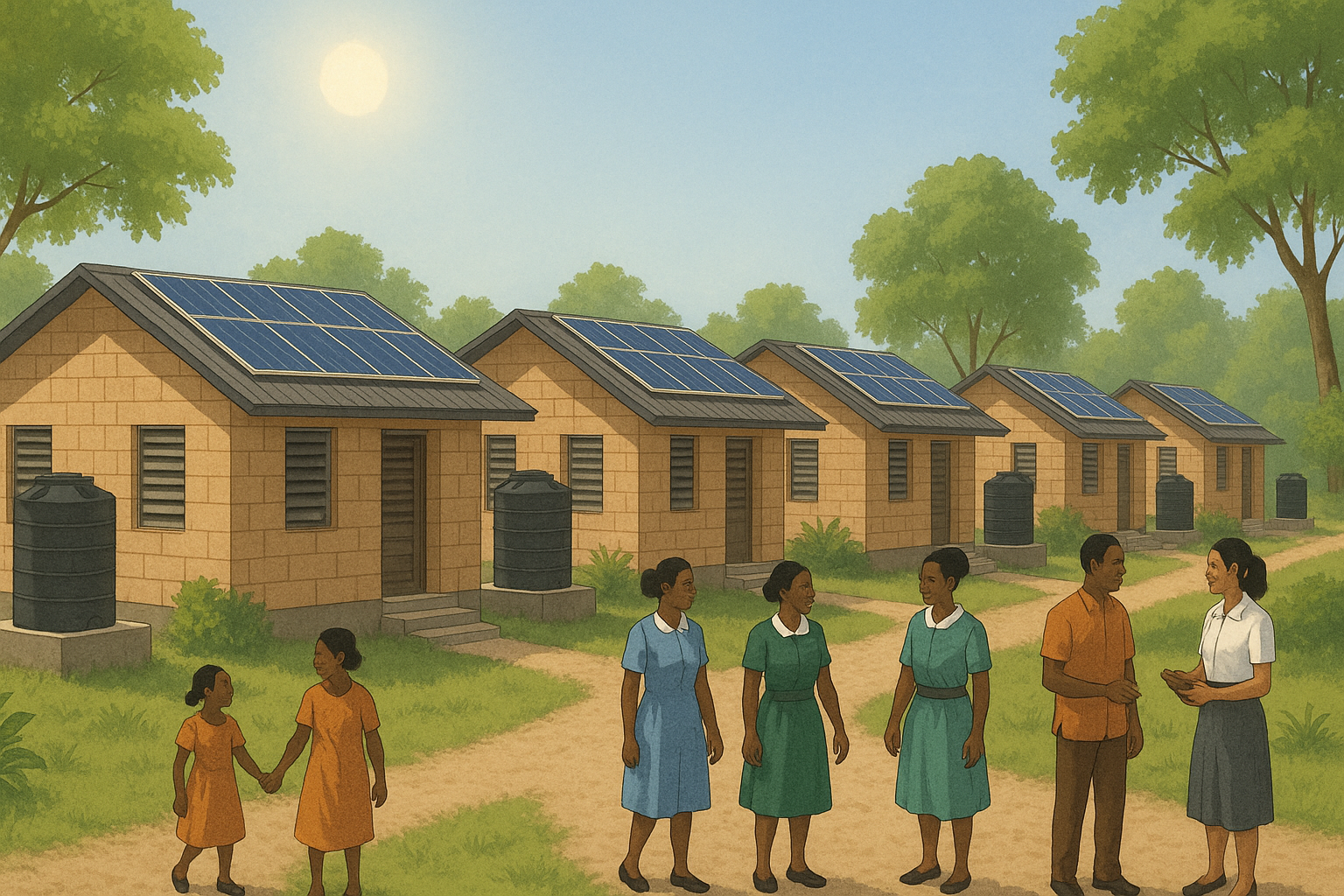Sustainable Social Housing for Ghana’s Future
"Key workers don’t just live in these homes — they can invest in them too, sharing directly in the returns."


Yaw Boateng
Published on 3 September 2025
A Moment for Ghana
Imagine a teacher in Kumasi or a nurse in Tamale moving into a semi-detached, EDGE-certified home — affordable, sustainable, and secured through a transparent model that keeps ownership in Ghanaian hands.
Ghana has already laid the foundation. With Lahagu, Afreh proved that Ghanaian developers can deliver affordable, green housing.
At LandLedger, we believe Ghana’s next “moment” is to combine Afreh’s delivery capability with tokenised financing — creating sustainable social housing for key workers that is affordable, accountable, and scalable.
Ghana’s Housing Challenge
Ghana faces a housing shortfall of more than 1.8 million units, with the gap widening each year. Too often, policy attention focuses on Accra and Kumasi, where land is most expensive, leaving regional capitals underserved. For many families, the affordability gap is daunting: the cheapest formal house costs more than GHS 200,000, far beyond the reach of ordinary incomes.
The pressure is particularly acute for key workers. Teachers, nurses, and police officers — the backbone of our public services — are often left renting in unregulated markets, spending a disproportionate share of their salaries on housing. At the same time, Ghana’s reliance on imported materials continues to drive up costs while adding to our climate burden.
The challenge is clear: affordable homes that are sustainable, dignified, and designed for Ghanaian realities are urgently needed.
Learning from Past Efforts: Saglemi & Pokuase
Ghana has long recognised the need for social housing. Projects such as Saglemi and Pokuase were conceived with strong intentions — to provide thousands of affordable homes.
- Saglemi faced financing disputes and governance hurdles, leaving units incomplete.
- Pokuase struggled with funding flows and sequencing, despite initial promise.
These experiences highlight a vital lesson: ambition alone is not enough — delivery requires transparent financing and accountability.
Build–Operate–Tokenise (BOT): LandLedger’s Model
LandLedger reimagines the PPP model as Build–Operate–Tokenise (BOT) — a financing structure where homes are built by a trusted developer, operated by local municipal authorities, and funded transparently through tokenised fractional ownership.
- Build: Afreh, with proven experience in affordable housing, constructs semi-detached, EDGE-certified homes on state-provided land, using sustainable methods such as compressed earth blocks (CEB) and rammed earth. Having already delivered Ghana’s first EDGE-certified affordable housing at Lahagu, Afreh brings the experience, credibility, and potential to deliver at scale.
- Operate: Local municipal authorities act as operators, responsible for rent collection and oversight. Rent inflows and outflows are tracked on-chain, ensuring transparency. A modest management fee provides a sustainable incentive for municipalities to maintain the stock.
- Tokenise: Capital is raised upfront through fractional token ownership. Each token is anchored in the land parcel and project SPV from day one. Investor funds are disbursed in verified stages, ensuring accountability and delivery.
This model ensures funding transparency, public accountability, and sustainable management, addressing the gaps that slowed past projects.
Worked Example: A 100-Unit Semi-Detached Community
- Design: 50 semi-detached blocks, 2–3 bedrooms per unit.
- Land & Infrastructure: Provided by the state.
- Build Partner: Afreh, bringing delivery expertise and credibility.
- Build Cost: ~GHS 25m–30m.
- Tokenisation: GHS 2,500 per token, raising upfront capital from local and diaspora investors.
- Discounted entry: No equity uplift (reflecting government land contribution). Investors instead earn steady yield + natural appreciation.
- Returns: 7–9% yields from rental income, plus long-term appreciation.
- Investor protection: Escrow-based disbursements tied to milestones (foundation, superstructure, finishing).
- Occupancy: Allocated to key workers with affordable rents aligned to their salaries. Crucially, key workers can also participate as investors by purchasing tokens, enabling them to earn returns from the very projects they live in and support.
- Sustainability: EDGE certification ensures 30%+ efficiency in energy, water, and materials.
(Illustrative example, based on conservative 2025 assumptions. Not an offering.)
Thoughtful, Culturally Attuned Design
A partnership with Afreh would deliver affordable, space-optimised homes that reflect Ghanaian cultural expectations and everyday needs. Each home would feature a separate kitchen, toilet, and washroom — a practical and cultural necessity in both urban and peri-urban Ghana. Layouts would be designed for functionality, maximising liveable space within affordable footprints.
Construction would use Compressed Earth Blocks (CEB), reducing embodied carbon and building costs. Louvred windows would provide natural ventilation, while low-flow fixtures would conserve water. Shared solar installations and polytanks would ensure reliable access to energy and water.
This is not about building the cheapest units possible. It is about creating eco-friendly homes that combine sustainability with dignity, privacy, and practicality for Ghanaian families.
Aspect
Traditional PPP
Blockchain-Powered BOT (LandLedger)
Government
Provides land + carries fiscal burden
Provides land only, no new debt
Developer
Financed through debt / concessions
Afreh builds via tokenised funding
Operator
Private concessionaire
Municipal authority with blockchain-tracked accountability
Ownership
Reverts after concession
Stays with SPV, fractionalised via tokens
Financing
Complex, long-term, often opaque
Transparent, upfront, milestone-based
Investors
Limited access, long lock-ins
Local + diaspora, tradable after lock-in
Beneficiaries
Housing delivered, but risks of delay
Key workers housed on affordable, accountable terms
Why This Matters for Ghana
For key workers, this model provides dignified, affordable homes close to where they serve. It also creates the opportunity for them to become co-investors, purchasing tokens and sharing in the financial benefits of housing delivery.
For government, it delivers housing policy goals without creating new debt, while retaining local oversight through municipal operators. This aligns directly with Ghana’s National Affordable Housing Programme and complements initiatives such as Agenda 111, which is expanding healthcare infrastructure and creating demand for key worker housing.
For Afreh, it showcases the ability of Ghanaian developers to deliver at scale.
For investors, the distinction is clear:
- In prime property projects (mid-tier and luxury), equity uplift serves as a fair incentive for early investors who take on land, construction, and market risk. This mirrors global practice and rewards those who commit capital at the riskiest stage.
- In PPP social housing projects, where government contributes land and infrastructure, investors instead earn steady rental yields and benefit from natural long-term appreciation. This preserves affordability while ensuring investors are fairly rewarded.
And for the diaspora, with over $4.6 billion in annual remittances, tokenisation offers a transparent and accountable way to channel capital into homes that directly serve their communities.
The Bottom Line
Ghana’s past projects such as Saglemi and Pokuase prove the country’s ambition to deliver affordable housing at scale. The next step is accountability and transparency.
With Afreh’s delivery capability, municipal operators ensuring oversight, and LandLedger’s tokenised financing, the model combines affordability, sustainability, and governance.
Crucially, LandLedger adapts its approach depending on context:
- In prime property projects, equity uplift incentivises investors to take on full market risk.
- In PPP social housing, where the state provides land and infrastructure, the focus is on stable yields and natural appreciation — preserving affordability while ensuring investors are fairly rewarded.
What starts with 100 homes in Tamale could scale to thousands across Ghana — and ultimately across Africa — setting a new standard for affordable, sustainable housing delivery.
📖 Glossary of Key Terms
- Tokenisation – Turning property rights into digital tokens, each representing fractional ownership.
- Build–Operate–Tokenise (BOT) – A financing and delivery model used by LandLedger. Homes are built by a developer (e.g. Afreh), operated by local municipal authorities, and funded through tokenised fractional ownership with milestone-based investor protection.
- Semi-Detached Unit – Two homes sharing a central wall, lowering costs while maintaining privacy.
- EDGE Certification – IFC’s green building standard, verifying 20%+ efficiency in energy, water, and materials.
- Compressed Earth Blocks (CEB) – Sustainable construction material made from locally available soil, cutting costs and carbon.
- Rammed Earth – Traditional, sustainable construction method using compacted soil.
- Key Workers – Teachers, nurses, police officers, and others essential to public services.
- Municipal Operator – Local authority that manages day-to-day operations, rent collection, and oversight of social housing.
- Management Fee – A modest portion of rent paid to the municipal authority for ongoing oversight and maintenance.
- Milestone-Based Disbursements – Developer payments tied to verified progress, protecting investors.
Disclaimer
This article is for informational and educational purposes only. It does not constitute financial advice, an offer to sell, or a solicitation to buy any security or investment product. All examples and figures provided are illustrative and should not be relied upon for investment decisions. LandLedger Technologies is not currently licensed by the Securities and Exchange Commission (SEC) of Ghana or any equivalent authority. Any future investment offerings will comply with all applicable laws and regulatory approvals.
Get Market Insights
Subscribe to our newsletter for the latest trends, opportunities, and expert analysis.